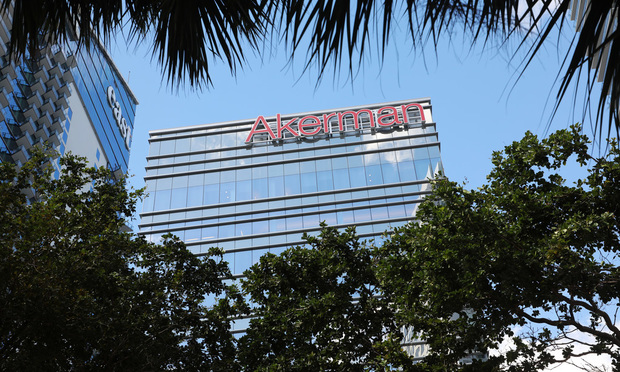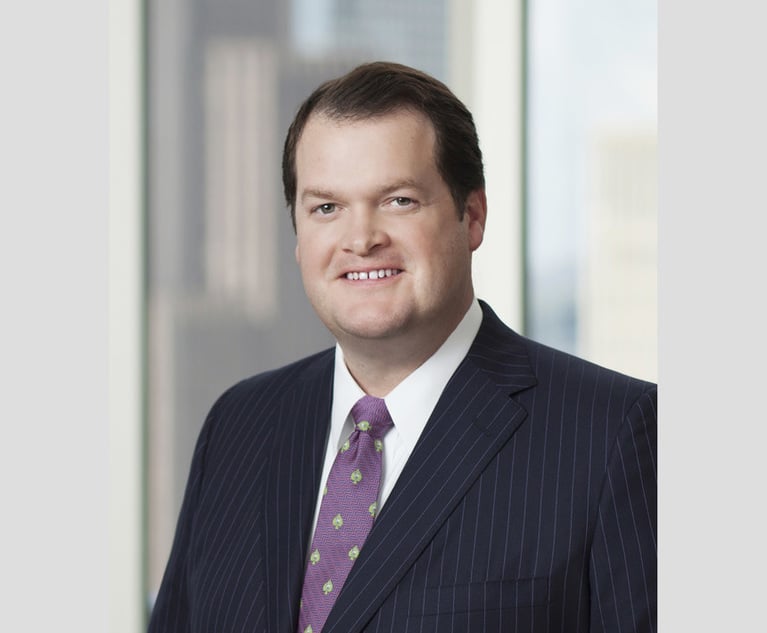Akerman Makes a Play for More Middle-Market Private Equity Work
The Am Law 100 firm hopes to seize profitable and growing opportunities for lawyers advising private equity clients with leveraged buyout funds below $1 billion.
April 03, 2018 at 12:34 PM
4 minute read
 Akerman's office in Miami.
Akerman's office in Miami. Akerman, a Florida-based Am Law 100 firm riding a seven-year streak of financial growth, recently introduced its first report about middle-market private equity dealmaking.
The “Akerman PErspectives Report” uses data from Pitchbook.com and tracks “often underreported yet significant activity of the sub-$1 billion and sub-$500 million private equity buyout funds,” according to a statement by the firm.
Overall private equity buyout fundraising for those market sectors has grown, Akerman's analysis concludes. Specifically, the firm's report states that for those sectors more than $154 billion of investment was realized in 2017, a 60 percent increase from the previous year.
Carl Roston, co-chair of Akerman's corporate group, led the team that created the report. Akerman hopes to seize profitable and growing opportunities now emerging for lawyers advising private equity clients that have leveraged buyout funds below $1 billion, Roston said.
Roston expects dealmaking by middle-market private equity firms to continue growing in 2018. One of the reasons that Roston is optimistic about such an uptick is what he calls “heightened interest in Section 1202 of the Internal Revenue Code, which allows PE funds to avoid the 23.8 percent federal capital gains tax on dispositions of qualified portfolio companies.”

That new tax wrinkle is especially useful for making profitable more modest-sized deals. And so what does the potential robustness of the middle-market private equity sector mean for Big Law? Potentially more business for firms that are not at the top of the Am Law 100, Roston said.
“Clients are looking for lawyers who are doing a high volume of transactional work who are very much interested and dedicated to this sector of the market,” Roston said. “Private equity clients want high volume complex LBO work and they are also insisting on a level of client service and continuity of staff.”
Such demands from those types of private equity clients create opportunities for Akerman, Roston said. The firm is not, he concedes, in the top tier in terms of private equity deals for leveraged buyout funds with more than $1 billion. Those deals typically go to firms such as Debevoise & Plimpton or Kirkland & Ellis (the latter of which raided Debevoise in December for its former funds head), both of which consistently place in the top ranks of private equity advisers, Roston said.
But Akerman has hired lateral partners from those firms who have both the sophistication and willingness to work deals beneath the $1 billion threshold for leveraged buyout funds. Akerman's private equity clients have the advantage of working repeatedly with the same teams of lawyers often led by individuals with experience working on bigger deals, Roston said.
“We are seeing an opportunity for firms that are not in the Am Law 20 but that have that level of sophistication to grow in this sector of the market,” Roston said.
Akerman, a 631-lawyer firm known for launching innovative new products, did recently see a group of Chicago-based lawyers break away to form their own boutique. But Akerman has kept growing, recently bolting on a six-lawyer shop in South Florida and hiring corporate and private equity lawyers in Austin, Texas, where Akerman opened an office in 2016 after absorbing a group of 30 lawyers from dissolving local firm Beirne, Maynard & Parsons.
This content has been archived. It is available through our partners, LexisNexis® and Bloomberg Law.
To view this content, please continue to their sites.
Not a Lexis Subscriber?
Subscribe Now
Not a Bloomberg Law Subscriber?
Subscribe Now
NOT FOR REPRINT
© 2025 ALM Global, LLC, All Rights Reserved. Request academic re-use from www.copyright.com. All other uses, submit a request to [email protected]. For more information visit Asset & Logo Licensing.
You Might Like
View All
Paul Hastings, Recruiting From Davis Polk, Adds Capital Markets Attorney
3 minute read
Goodwin Procter Relocates to Renewable-Powered Office in San Francisco’s Financial District


Greenberg Traurig Combines Digital Infrastructure and Real Estate Groups, Anticipating Uptick in Demand
4 minute readTrending Stories
- 1Charlie Javice Fraud Trial Delayed as Judge Denies Motion to Sever
- 2Holland & Knight Hires Former Davis Wright Tremaine Managing Partner in Seattle
- 3With DEI Rollbacks, Employment Attorneys See Potential for Targeting Corporate Commitment to Equality
- 4Trump Signs Executive Order Creating Strategic Digital Asset Reserve
- 5St. Jude Labs Sued for $14.3M for Allegedly Falling Short of Purchase Expectations
Who Got The Work
J. Brugh Lower of Gibbons has entered an appearance for industrial equipment supplier Devco Corporation in a pending trademark infringement lawsuit. The suit, accusing the defendant of selling knock-off Graco products, was filed Dec. 18 in New Jersey District Court by Rivkin Radler on behalf of Graco Inc. and Graco Minnesota. The case, assigned to U.S. District Judge Zahid N. Quraishi, is 3:24-cv-11294, Graco Inc. et al v. Devco Corporation.
Who Got The Work
Rebecca Maller-Stein and Kent A. Yalowitz of Arnold & Porter Kaye Scholer have entered their appearances for Hanaco Venture Capital and its executives, Lior Prosor and David Frankel, in a pending securities lawsuit. The action, filed on Dec. 24 in New York Southern District Court by Zell, Aron & Co. on behalf of Goldeneye Advisors, accuses the defendants of negligently and fraudulently managing the plaintiff's $1 million investment. The case, assigned to U.S. District Judge Vernon S. Broderick, is 1:24-cv-09918, Goldeneye Advisors, LLC v. Hanaco Venture Capital, Ltd. et al.
Who Got The Work
Attorneys from A&O Shearman has stepped in as defense counsel for Toronto-Dominion Bank and other defendants in a pending securities class action. The suit, filed Dec. 11 in New York Southern District Court by Bleichmar Fonti & Auld, accuses the defendants of concealing the bank's 'pervasive' deficiencies in regards to its compliance with the Bank Secrecy Act and the quality of its anti-money laundering controls. The case, assigned to U.S. District Judge Arun Subramanian, is 1:24-cv-09445, Gonzalez v. The Toronto-Dominion Bank et al.
Who Got The Work
Crown Castle International, a Pennsylvania company providing shared communications infrastructure, has turned to Luke D. Wolf of Gordon Rees Scully Mansukhani to fend off a pending breach-of-contract lawsuit. The court action, filed Nov. 25 in Michigan Eastern District Court by Hooper Hathaway PC on behalf of The Town Residences LLC, accuses Crown Castle of failing to transfer approximately $30,000 in utility payments from T-Mobile in breach of a roof-top lease and assignment agreement. The case, assigned to U.S. District Judge Susan K. Declercq, is 2:24-cv-13131, The Town Residences LLC v. T-Mobile US, Inc. et al.
Who Got The Work
Wilfred P. Coronato and Daniel M. Schwartz of McCarter & English have stepped in as defense counsel to Electrolux Home Products Inc. in a pending product liability lawsuit. The court action, filed Nov. 26 in New York Eastern District Court by Poulos Lopiccolo PC and Nagel Rice LLP on behalf of David Stern, alleges that the defendant's refrigerators’ drawers and shelving repeatedly break and fall apart within months after purchase. The case, assigned to U.S. District Judge Joan M. Azrack, is 2:24-cv-08204, Stern v. Electrolux Home Products, Inc.
Featured Firms
Law Offices of Gary Martin Hays & Associates, P.C.
(470) 294-1674
Law Offices of Mark E. Salomone
(857) 444-6468
Smith & Hassler
(713) 739-1250










